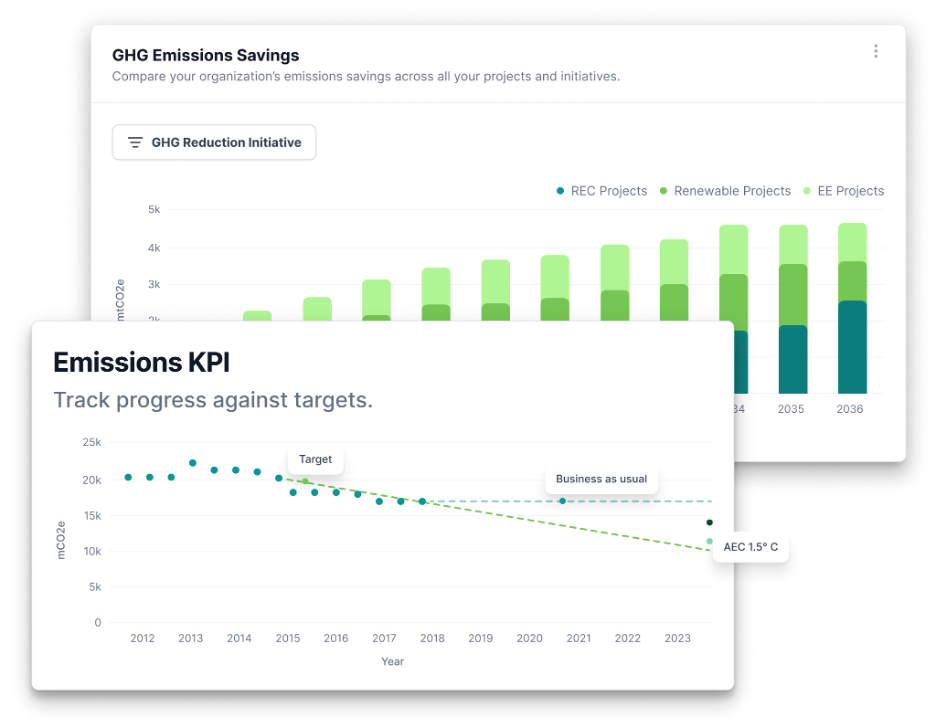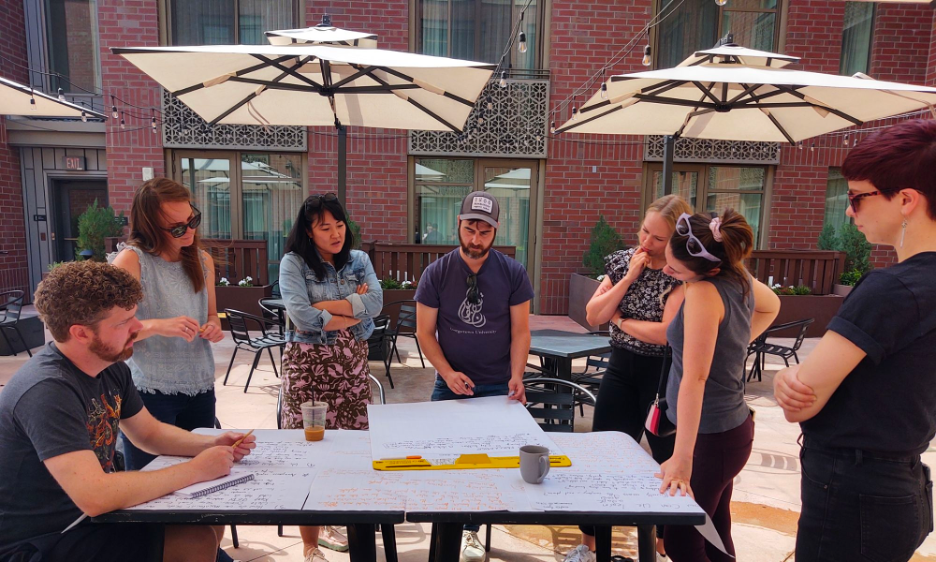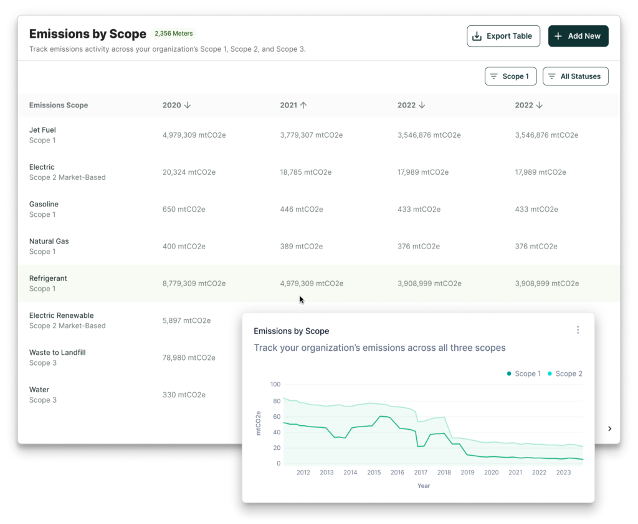Decarbonizing Supply Chains: Tim Weiss, Co-Founder & CEO of Optera, on the Complexity of Emissions
Blackhorn portfolio company Optera is a carbon management software system providing companies with the tools and services to track, manage, and achieve their emissions goals. From pioneering pay-as-you-go solar in Africa to working with the World Economic Forum on climate change, Tim Weiss, co-founder and CEO of Optera, has long been at the forefront of decarbonization.
We talked with Tim about why Scope 3 emissions are a different animal, how companies of all sizes can build out their emissions accounting and ESG programs, and his hopes for the future of the supply chain. For more information on open roles at Optera, visit their job board here.
Tell us about yourself. What experiences led you to start Optera?
I’ve always been a mission-driven individual. When I was an undergraduate student at Colorado College, I intentionally focused my degree around issues I found meaningful; I had the privilege of an incredible and loving upbringing, and wanted to use the foundations laid for me by my parents to their best purpose. The environmental field was a perfect blend of my head and my heart – creating a sustainable planet was an issue I fundamentally cared about, and as a quantitative individual, I saw that there was ample opportunity to leverage data within the industry.
In 2015, I met my co-founders Jason and Ty. For years, they had been supporting Fortune 500 companies and many leading NGOs as consultants, analyzing how corporations were measuring and managing their carbon emissions. When I first met Jason and Ty, they were grappling with how they could work with businesses in a more scalable way – how to develop technologies and other solutions that would enable them to address the climate crisis at scale. Together, we completed market research. I was responsible for crafting the first set of interview questions we took to Fortune 500 sustainability officers. It was in these early days of science-based targets, on the tails of the Paris Agreement when an increasing number of companies were trying to align their initiatives with the latest in climate science, that we realized there wasn’t a viable solution available for companies to manage their sustainability practices – it was all spreadsheets and consultants. So, we began bootstrapping Optera.
What problems are you trying to solve at Optera? Why is this relevant now and why you?
We are in the midst of a transition to the low-carbon economy, and no company knows how they’re going to do it. Every industry will look fundamentally different in the next 5 to 10 years if we bend the curve and progress on the 1.5 or 2-degree pathway.
Optera is making this transition manageable for companies. Right now, true sustainability is not achievable for many companies because they don’t know what their emissions are or where they are coming from – companies are relying on high-level assumptions that are not actionable. At Optera, we help companies peel away layers of their emissions assumptions, unearthing data that they can make business decisions against. We ask the relevant questions: what suppliers are at the greatest risk when transitioning to the low-carbon economy? What commodities? What products can you no longer sell because they are predicated on a fossil fuel economy?

We provide the data foundation for businesses. I believe what is driving this market is a general understanding among investors, regulators, customers, and employees that we need to determine which companies will thrive in this green future, and which will not. Smart companies and executives know the primary unknown variable is the speed of the transition, and are proactively trying to answer the question. Ultimately, we serve businesses that want to measure their incremental sustainability improvements and build maturity in their organization to better achieve their environmental goals.
What is your vision for the future of Optera? What industry sectors are you looking to expand into? How do you go from the customer logos you’re serving today to where you see opportunities over the horizon?
A lot of our customer concentration is in the electronics and retail industries, as well as the financial sector.There are several reasons why we have chosen to focus on these areas. First, we can cater to their common set of pain points around scope 3 emissions with one product. Second, those industries are moving faster than all others. The brands we work with – Dell, Cisco, HPE – and the big-box retailers they cater to are under tremendous scrutiny from consumers, regulators, and the market at large.
As this unfolds, other industries will need to follow suit and catch up. Our approach has been to help the leaders lead; we anticipate, however, that other industries will be in the market, seeking a solution in the coming years as other industries mature.
We are currently focusing on companies that have big decarbonization problems; we are focusing on companies that have many components to transition; we are focusing on companies that have to be really thoughtful in their execution, from transitioning their supply chain to their product mix to their manufacturing practices. We have chosen to place emphasis on the industries and companies that have the greatest impact on the world, and will continue to do so. My hope is that this industry ultimately touches every company in the world – but, that dream is dependent on whether regulators will force big companies to manage their Scope 3 emissions and require private companies of every shape and size to share their data publicly.
When tracking emissions (Scope 1, 2, and 3), what are the factors that you take into consideration? What often gets overlooked in carbon accounting?
Scope 1 and 2 emissions are operational emissions – emissions that stem from things you operate. The ultimate source of information – the fundamental data source – to quantify your emissions is a bill; it is the closest proxy to financial accounting we have in our industry. I say that because it’s difficult, but not crazy difficult. People would be able to track their Scope 1 and 2 emissions without sophisticated software providers.
Scope 3 is a different animal. It’s where the existential challenges lie for organizations as they transition to the low-carbon economy. What are your product and operating inputs, and do those inputs have to change? What do you sell, and how is it used in the world? If you are an automaker, you are actively transitioning your entire product mix from internal combustion engines to EVs – that’s a massive transition.

Understanding your Scope 3 emissions is where organizations understand their transition risk and opportunity – that’s why we focus on those emissions within our product. Scope 1 and 2 are not where differentiation lies in our market. That’s why at Optera, we’ve productized a way to measure this massively complex problem without reliance on convoluted Excel spreadsheets or brilliant consultants. Ultimately, we are pairing our customers’ data – how much and what they are spending and buying – with real supplier data so they can quantify their emissions using actionable insights. Then, the work becomes determining which suppliers we can engage with and in what ways.
Downstream, we are serving retailers with massive, diverse product portfolios. The challenge of transitioning these retailers’ entire portfolios is one that will take decades, and we have to provide a consistent, reliable data source over that entire period of time. What that means is, again, moving away from assumptions, and gathering actionable and accurate data on the products retailers sell and the exact suppliers retailers transact with; or, for investors, gathering direct data on their portfolio companies and other assets. It means not relying on industry averages or broad-based assumptions, and instead putting in the work to collect direct data.
Is it ever “too early” to start considering ESG? What metrics should smaller companies look at when they are building out their sustainability strategy?
It is never too early to start caring about ESG.
On the social and governance front, it’s a broad mix of issues that have implications across your organization. What are your hiring practices? What methods do you have in place to monitor the health and safety of workers? What are the diversity, equity, and inclusion standards you operate by? Governance focuses on the checks and balances that exist across an organization: how an organization maintains fairness and justice.
In terms of environmental data, the best place to start is carbon emissions, specifically Scope 1 and 2 – understanding your operational footprint. The foundation for a sustainability program is increasingly becoming climate because it is the only environmental issue you can translate into a single number and have a semblance of your impact on the world. All other environmental data points are more local and context-specific in nature. For example, when you are considering biodiversity, it’s about the environmental ecosystems you are impacting. With climate, however, it does not matter where the CO2 is emitted – it all goes into the atmosphere and has the same greenhouse gas effect.
I’m definitely biased here, but folks should really start building out their ESG programs by considering their Scope 1 and 2 emissions. Scope 2 emissions are the easiest to build sophistication around managing. There are easy versions of Scope 3 tracking that organizations can start with: business travel, employee commuting, and waste. However, organizations ultimately have to understand their total exposure to transition risks associated with their net-zero journey; and that only comes when you do a full account across Scope 1, 2, and 3.
What are the markers of a successful ESG/sustainability program? Can you give an example of a particularly successful relationship you’re part of? How do you quantify success in your work?

At a high level, the marker of success in a sustainability program is making claims you can stand behind and continue to stand behind as the years progress. A successful sustainability program has a roadmap that is rooted in accurate data and can affect impact.
There is no standard for any organization to meaningfully claim net zero. It does not exist unless you have fully delineated all of your combustion fuels across everything you operate, including your value chain – this really does not exist yet. While there are many companies that make net zero claims, they have to do so with an asterisk, and that asterisk is really important. I am still very proud of the organizations we work with that have accomplished all they can reasonably accomplish and have made net zero claims.
What I am most proud of is the work our partner companies have taken to actively manage and decarbonize their supply chains; this work has had incredible ripple effects orders of magnitude larger than even our partners’ Scope 3 emissions. If you are a company completing emissions accounting, you know that you are a fraction of a supplier’s total business; if you can get your supplier to make improvements from an emissions standpoint, you are benefiting all companies working with the supplier. The effect on the planet is so much larger. What we have seen is that our product – our ability to support organizations – has an outsized impact on how industries are maturing and decarbonizing.
There is a time value of carbon that is overlooked by many people, where a ton of carbon saved today is far more beneficial than a ton of carbon saved in 10 years. All of the work we are seeing in mitigating and reducing Scope 1 and 2 emissions is tremendous; the outsized positive effects of Scope 3 emissions reductions we’ve seen across our clients is something we are encouraged by.
What do you see in the future for corporate sustainability from a legislation/policy/regulation perspective?
We have been operating in a voluntary world for so long in the sustainability industry. The good news is that there is significant precedent and standardization enabling regulation to be enacted (all things considered). EU’s new regulation, CSRD, is mandating the reporting and verification of Scope 1, 2, and 3 emissions by publicly traded companies and companies conducting significant business in the EU. All of this will have positive ripple effects on the economy as organizations require their suppliers to step up.
I see regulation using the precedent set by the voluntary market effectively, and I see regulation setting the rules of the road in a way that provides certainty. Right now, certain companies are way ahead and certain companies are not even at the starting line. Regulation is going to require all companies to align around a common understanding of what the standards are. It is going to bring about good scrutiny.
In the United States, I am hopeful that we are going to approach parity with the EU. Undoubtedly, this is a politicized issue within the United States. It will be fought over; there will be backlash; there is no question. The common thread here is that it makes sense. What I often say is, if you are a pension fund manager crafting a target date fund out to 2040, you’re not doing your job if you’re not thinking about the transition away from fossil fuels; if you are an insurance company and you are considering your exposure over the next 20 years, you’re not doing your job if you’re not considering the impact of climate. Political pressure aside, that is still going to be true. None of the driving forces behind this market are going to change. The timing of when regulation takes effect or how long it’s fought over will be slightly up in the air. However, I am quite hopeful because, despite how many wrong turns we make as a human species, we keep going in the right direction.
As a former music teacher, who are some of your favorite musical artists or what are some of your favorite songs?
My bias is toward anything with soul. My wife and I met playing in a funk band – a 14-piece with a full horn section. I’m also a jazz musician at heart and love improvisational music. I’d say the artist that comes to mind is Julian Lage, an American guitarist and composer. Hiatus Kaiyote is another band I always go back to – they are one of the most original groups around.